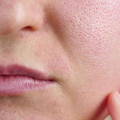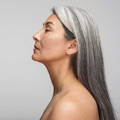What is Bakuchiol and Why Do You Need it?
The Complete Buyer's Guide
Bakuchiol (pronounced buh-KOO-chee-ol) is one of the most exciting natural skincare ingredients around.
Because of the way Bakuchiol is extracted directly from the babchi seed, it's an ingredient that has some controversy. The reason for the controversy? Brands can claim their product "contains Bakuchiol" even if it doesn't contain the pure and concentrated form.
If you're looking for our award-winning bareLUXE Bakuchiol serum, look no further!
However, if you're still learning about this amazing ingredient and deciding whether it's time to give it a try, read on for answers to all your questions in this most comprehensive review available!
What is Bakuchiol?
Bakuchiol is one of the fastest growing skincare ingredients on the market. It targets age-related skin changes, it's effective when compared to retinol, and it's natural!
The chemical, Bakuchiol, was first identified by G. Mehta, U. Ramdas Nayak, and S. Dev in 1966 at the National Chemistry Laboratory in Poona, India. It was named after the Bakuchi plant. The chemical has since been isolated from other plants, but not in as high a quantity.
The plant, Psoralea corylifolia, has been used for centuries in both traditional Chinese and Indian Ayurvedic medicine. As a result, the plant and seeds have many names depending on the country of origin and dialect spoken; for example, Babchi, Bakuchi, Babechi, Bavanchi, Bu Gu Zhi, Ku Tzu, Cot Chu. This article describes the use in Ayurvedic medicine in much greater detail.

In cosmetics, Bakuchiol began to be used in North America and Europe in 2007 when it was brought to market by Sytheon. As a result, there is a growing demand for Bakuchiol products in the booming natural skincare market.
So why all the hype?
In the quest to produce natural products, the use of active ingredients often falls flat. Clinical studies on ingredients don't always hold true in the final products. The reason could be because the ingredients are formulated incorrectly, they get deactivated, or bias played into the original clinical studies (effectiveness sells!).
When something natural has measurable effects in the skincare world, especially repeatedly, it gains A LOT of attention.
If you want to start using Bakuchiol products, this is what you need to know:
Bakuchiol Manufacturers
The primary manufacturer of Bakuchiol is Sytheon. They use a unique method to extract just the Bakuchiol molecule (>99%). This allows an exact concentration, i.e. 1%, to be added to face products. While Sytheon doesn't make the final cosmetic products, they are the leading supplier for brands that use the specific ingredient.
Sustainable Babchi Seed Harvesting
The Psoralea corylifolia plant is not endangered (though some other Psoralea plants are on the list). It grows wild and is wild-harvested, not farmed. To maintain biodiversity and sustainability, companies that manufacture products using babchi seeds must follow guidelines to avoid overharvesting and not contribute to agricultural exploitation.
Sytheon has an informative website about their product and processes. In addition, they work closely with the Indian Government to ensure sustainability is maintained.
Bakuchiol is vegan, and the product produced by Sytheon is cruelty-free.
Psoralea Corylifolia: It's all in the name
Due to the science used to extract Bakuchiol from the babchi seeds, it cannot be labelled by standard botanical naming rules.
When a skincare product contains a carrier oil or extracts made from the babchi seed, it would be labelled on the ingredient list as Psoralea corylifolia seed extract or Psoralea corylifolia seed oil. These carrier oils are also called by their non-botanical names: bakuchi oil and babchi oil.
The difference between babchi oil vs Bakuchiol is the method of extraction. Babchi oil is produced by cold-pressing the babchi seeds, just like other seed oils. Babchi oil does contain Bakuchiol, but in order to isolate the pure chemical, a different chemical process is needed.
When a skincare product specifically uses Bakuchiol, the only way it's allowed to be labelled is "Bakuchiol." Though extracted from the plant, it is not considered a botanical extract in the traditional sense, so botanical naming rules do not apply.
Babchi Seed Oil Extraction
A complex method of isolating and extracting Bakuchiol from the babchi seed is called monomolecular extraction. That is why the naming rules described above apply.
If babchi seeds are cold-pressed or expeller-pressed, you have Psoralea corylifolia seed oil. If the seeds or leaves are macerated in oil or extracted with a solvent (i.e. ethanol, acetone), you have Psoralea corylifolia seed/leaf extract. Again, these might be referred to as babchi oil or bakuchi oil - but they represent an unrefined carrier oil and not the pure chemical form of Bakuchiol that is sought after.
According to one study that analyzed babchi seed carrier oils, these extracts will contain some Bakuchiol (1.6%-12%). However, there is no standardization. This means there could also be irritating or undesired chemicals, like psoralens, which can be harmful to the skin in high concentrations.
If you buy and use products containing babchi seed oil or bakuchi oil, you have no way to know how much Bakuchiol is present or what other chemicals are. There is no requirement for the brand to disclose this to you.

Image source: bakuchiol.net
The money you spend should go towards the ingredients you want. This is especially true since the Bakuchiol research studies used specific percentages of the ingredient (0.5-2%).
Bakuchiol Skin Benefits
Bakuchiol benefits for the skin are numerous. Bakuchiol is a powerful antioxidant. It also has anti-inflammatory and anti-bacterial properties. Bakuchiol has similarities to resveratrol. Like retinol, it is felt to act on skin cells that produce collagen and melanin. Unlike retinol, it does not act like a chemical exfoliant. It also won't cause photosensitivity.
Based on the clinical evidence, Bakuchiol users should expect to see anti-aging effects like improved skin firmness, reduced fine lines and wrinkle depth, a more even skin tone, reduced appearance of dark spots, and improved acne.
It's safe to say the cosmetic industry is excited about this ingredient and the science supporting its use. We summarized the current Bakuchiol research while developing our face oil serum. We keep this review updated as more becomes known.
The Clinical data is summarized below:
Bakuchiol concentrations tested in the studies: 0.5-1.5%.
These studies suggest Bakuchiol is a chemical worth trying - especially if you are looking for alternatives to retinol.
We've compared the to ingredients head-to-head in this comprehensive bakuchiol vs retinol article.
Bakuchiol Marketing Controversies
Brands considering whether to use pure Bakuchiol are making a business decision. It's an expensive molecule. It's also thick, oily, and brown, making it tricky if a brand wants a particular look for the product.
Brands have to choose between using the best concentration for effectiveness and capitalizing on popularity (but keeping the concentration low enough to not worry about colour or aroma).
The sensory aspect of luxury cosmetics cannot be denied. If a brand is trying to create a light, fluffy, pink masterpiece, that goal will influence whether or not they use a high concentration of brown oil.
When a product is marketed as "containing Bakuchiol," but the label says Psoralea corylifolia seed oil or (babchi) fruit extract, it contains traditional extracts. It doesn't have the concentrated, purified version of Bakuchiol.
This means the consumer might see results, but it's just as possible they will get no effect or even side effects from using an unpurified ingredient.
Pregnancy is another area where bakuchiol gets a lot of attention. Bakuchiol is the safer choice in pregnancy, though marketing it in such a way can be problematic.
Since Bakuchiol is compared to retinol, new terms have emerged like: Bio Retinol, Phyto Retinol, and Botanical Retinol. These are unregulated marketing terms used to help a brand tell consumers what they are trying to sell, but there are no rules.
Summary
As a consumer, you already know if your skin tolerates retinol. You also know if you prefer to use natural plant substances over other options. If you're looking for a retinol alternative or if you've decided to give Bakuchiol a try, then this guide will help you make a choice that will maximize the chances you'll have a great result.
Related Articles





